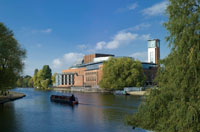Trouble ahead?
With Lottery funding for investment in theatre buildings having slowed to a trickle in recent years, Mhora Samuel sees addressing the capital inadequacies of many theatre buildings as being a key priority in the future

Jeremy Hunt, speaking at the Heritage Alliance’s annual meeting in December, said: “The Lottery is here to help vitally important sectors through difficult periods”. However you look at it, this is certainly a difficult period for theatres facing the challenges of maintaining audiences, managing with reduced levels of public subsidy and continuing to attract funds from trusts and foundations in a climate of greater competition – whilst trying to cover the increasing overhead costs of buildings in need of investment. As the national advisory body for theatres, and as a statutory consultant on planning applications for theatres since 1976, The Theatres Trust has been advising local authorities on theatres’ development proposals at RIBA Stage D, helping theatres with all stages of their planning for capital schemes and advising arts Lottery distributors and the Heritage Lottery Fund (HLF) on applications related to theatres.
We have had major concerns about the reduction in capital funding for projects, and the lack of consideration given to investing in projects that could have helped theatres weather these hard times. Whilst there have been many significant successes – such as the rebuilding of the Royal Opera House, the new Lowry in Salford and the recently reopened Royal Shakespeare Theatre in Stratford-upon-Avon – many theatre buildings are still to benefit from any investment. In September 2010, Richard Fuller, MP for Bedford, asked how much funding HLF and Arts Council England (ACE) had allocated for the construction of new theatres and refurbishment of existing theatres in the past 10 years. In 2000–2010 ACE spent £102.5m on construction and £61m on refurbishment. The HLF spent £68.7m on refurbishment. Compare this with the £1.4bn of Lottery funding that went into around 100 new and 500 refurbished theatres, galleries and arts centres over the past 15 years. The majority of Lottery funds were allocated in the 1990s, and although theatres were proportionally a major beneficiary, there are well over 2,000 theatres around the country – a considerable number which have yet to receive a penny.
The Theatres Trust responded to the National Lottery Shares consultation in August 2010 and welcomed the proposals to reinstate allocations to the arts and heritage to their original levels. In our response, and again in recent evidence to the Culture, Media and Sport Select Committee, we expressed our view that theatres across the UK are still in need of a wide-reaching and coherent programme of capital investment to enable them to upgrade basic fabric, to make them more accessible and financially viable, to improve their environmental efficiency, to increase audiences and support our tourism industry, and to act as a catalyst for urban regeneration.
There are three areas that The Theatres Trust would like to see prioritised in future Lottery spending:
1. A commitment to newly increased levels of Lottery funding going into capital projects, particularly to support existing theatres that have either not benefited from previous capital Lottery schemes or whose economic, environmental, social and cultural future urgently depends on addressing the capital deficiencies (and potential opportunities) of their buildings. We would also like to see a much wider range of beneficiaries, including social enterprise, amateur and volunteer-led theatre operators. Given cuts to arts councils and local authority budgets, routes to arts Lottery funding should not be solely predicated on existing relationships with public funders. These are reducing in number and much excellent work will be unfunded by those bodies.
2. A commitment to capitalisation and the seed funding of endowments to support the long- term sustainability of buildings, sinking funds and maintenance programmes. The Secretary of State’s plans for an £80m match-funding scheme to promote philanthropic giving is good news and we would advocate that the Lottery has a role to play in pump-priming endowments, creating confidence among potential donors, and helping theatres to develop income streams that have a longer- term focus, establishing more solid financial foundations comprising income, funding and investments.
3. A greater recognition of the role that capital Lottery funds will have to play to ensure that arts, heritage and culture activities survive in communities. Whilst the Trust is a strong advocate of additionality, we have concerns over reactions by local authorities to reduce the levels of subsidy they make to theatres and performing arts centres within short time periods. The HLF’s recent announcement that a further £45m will be available to spend in 2011/12 and that it will offer up to 90% funding towards projects that find it hard to identify matched funds is reassuring. In the light of reductions facing arts and heritage, we would also like to see arts and heritage Lottery distributors considering the need to introduce a short-term scheme similar to that of the Office for Civil Society/BIG Fund’s Transition Fund, enabling community groups to “adapt to a different funding environment during a period when they are at risk from reductions in taxpayer funded income”.
If the Lottery is here to help us through these difficult times, let it once again support capital initiatives and help theatres to build their financial resilience – both now and for the future.
Join the Discussion
You must be logged in to post a comment.